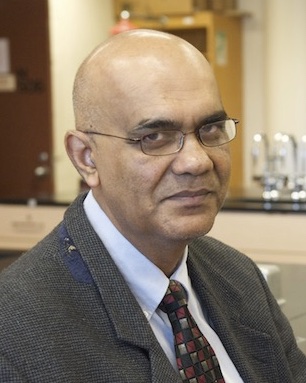Brahmadeo Dewprashad

Professor
Science
EMAIL: bdewprashad@bmcc.cuny.edu
Office: N-699N
Office Hours:
Phone: +1 (212) 220-1322
Professor Brahmadeo Dewprashad earned a doctorate degree in Organic Chemistry at Oklahoma State University, and completed post-doctoral research in Toxicology at Massachusetts Institute of Technology (MIT). He earned a master’s degree in Medicinal Chemistry at Loughborough University, England, and a bachelor’s degree in Chemistry at the University of Guyana.
His experience in the private sector has included positions held as a Chemist and Group Leader with Guyana Pharmaceuticals, and as a Senior Chemist at Halliburton Energy Services. He has held academic positions at the University of Guyana, Oklahoma State University, Kingsborough Community College/CUNY and the Sophie Davis School of Biomedical Education at City College/CUNY.
At BMCC, in addition to teaching chemistry and other subjects, Professor Dewprashad leads research projects focusing on the medicinal uses of plants and other areas, introducing students to lab protocols and providing for them a foundation in organic chemistry that helps enable their transfer to a science program at the bachelor’s degree level.
Professor Dewprashad has published widely on his research in the areas of medicinal uses of plants of the Caribbean, chemistry and pharmacology in alternative medications and other areas. A partial list of his publications is shown below; for a most extensive list, click “Resume” beneath his photo, left.
Expertise
Use of technology to facilitate science learning, Medicinal Use of Indigenous Plants of the Caribbean, Chemistry and Pharmacology of Alternative Medications
Degrees
- B.S. University of Guyana, Chemistry,
- M.S. Loughborough University, England, Medicinal Chemistry,
- Ph.D. Massachusetts Institute of Technology, Organic Chemistry,
Courses Taught
- This course is a two-semester course sequence that introduces principles and concepts of general, organic and biological chemistry. The laboratory will provide experimental applications of these chemical topics. They are liberal arts electives. They are recommended for students intending to transfer to bachelor's degree Allied Health Science curricula. CHE 121-122 cannot be granted credit to fulfill degree requirements for Science (A.S.) and Engineering Science (A.S.).
Students intending to apply for admission to programs such as Dentistry, Exercise Physiology, Medical Laboratory Science, Medicine, Pharmacy, Physician Assistant, Physical Therapy, or Veterinary Medicine need to enroll in CHE 201 instead of CHE 121 to meet admission or curricula requirements for these programs. Students intending to apply for admission to programs such as Diagnostic Medical Imaging (Sonography}, Exercise Science, Public Health, Radiology, or X-ray technician need to determine whether admission or curricula requirements for these programs require CHE 121 or CHE 201.
Course Syllabus - This two-semester course sequence is the study of the structure and properties of the fundamental classes of organic compounds with emphasis on reactivity, reaction mechanisms, stereochemistry, electronic theory, and applications to allied fields. Two terms are required.
Prerequisite for CHE 230 is CHE 202 or 220a??Prerequisite for CHE 240 is CHE 230
Course Syllabus - This is a two-semester course sequence that involves the study of chemical principles including atomic and molecular theories, molecular structure, and reactivity. The laboratory will include experiments illustrating the chemical principles. CHE 201-202 two terms required. Required in A.S. (Science) and A.S. (Engineering Science). Fulfills science requirement for A.A. (Liberal Arts).
Prerequisite for CHE 202 is CHE 201
Course Syllabus
Research and Projects
Publications
- A Light Lunch? A Ca se in Calorie Counting.,a??Using cases to teach quantitative reasoning/quantit ative skills in biology.a??, Eds. Herrid, K.; Schiller, N. NSTA press,
- ConfChem Conference on Case-B ased Studies in Chemical Education: Case Study Teaching in the Community College.,J. Chem. Educ ., 2013, 90 (2), pp 262a??263.
- A Case of Respiratory Distress,J. College Sci. Teaching
- Value of Cogenerative Dialogue s in STEM learninga??, Emerging Pedagogies for the New Millenium,Faculty Resource Ne twork publication
- The chemistry of cocaine,J. College Sci. Teaching
- Developing an invisible message about relative acidities of alcohols in the natural products henna, turmeric, rose petals and vitamin A,J. Chem. Educ
Honors, Awards and Affiliations
- 2007 NYC Louis Stokes Alliance ?Keepers of the Alliance Flame? mentoring award

